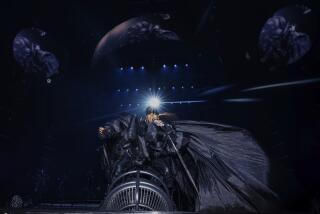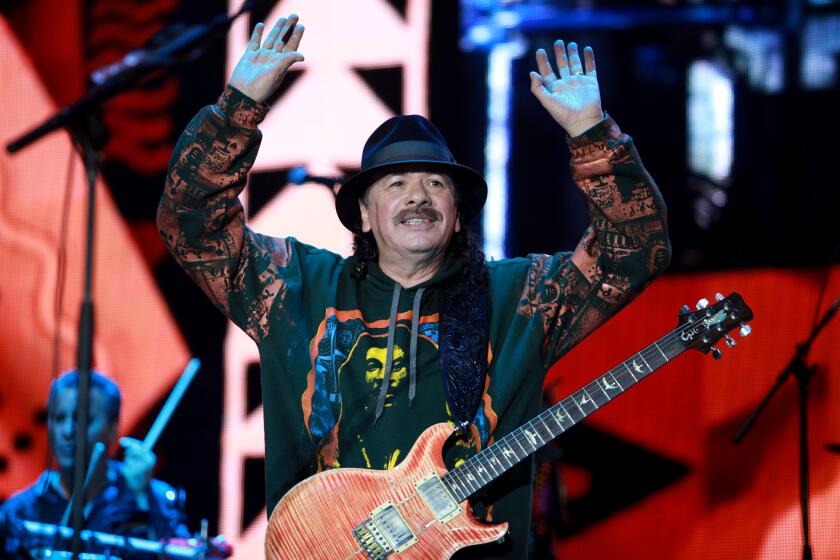‘Fonkified’ Ellington From Dr. John
- Share via
It is, by any definition, a strange combination--a veteran New Orleans pop and R&B; singer-keyboardist and the music of Duke Ellington. Yet here it is, in a new recording, “Duke Elegant” (** 1/2, Blue Note) that Dr. John (born Mac Rebennack) describes as a “fonkified” collection of Ellington numbers. And the characterization is not all that far off target.
Which raises a couple of problems: The first has to do with manner and style. Ellington’s music was sophisticated on every level--melodically, harmonically, rhythmically and in the way it was arranged for the Ellington orchestra. Dr. John’s musical approach is more basic, oriented toward groove rhythms with a seasoning of Cajun accents and R&B; phrasing.
The second problem is a matter of orientation. Ellington’s compositions were almost always conceived as music first, with words--when they came--arriving later. But lyrics are an essential and fundamental element in Dr. John’s creative expression.
The net result is that the interpretations included here will sound strange, indeed, to fans of Ellington’s music. “I’m Gonna Go Fishin’,” for example, originally composed for the film “Anatomy of a Murder,” with lyrics added later by Peggy Lee, is transformed from a soul-styled 3/4 rhythm to an R&B; 4/4. Does it work? Only if one is unfamiliar with the original. “It Don’t Mean a Thing If It Ain’t Got That Swing” simply loses the message of the title with a laid-back groove that fails to generate much sense of swing at all.
Some tunes, despite drastic revisions, take on intriguing new forms. “Perdido,” for example, which features Dr. John on Hammond B3 organ, survives a slowed-down tempo--with considerable help from Ronnie Cuber on baritone sax and drummer Herman Earnest III--in a fashion that provides an unusual, alternative approach to this venerable jazz chestnut. And Dr. John’s gnarly vocal style works surprisingly well on ballads such as “Solitude.”
For the most part, however, this is a shotgun musical marriage. Dr. John has tried similar offbeat combinations in the past, occasionally with greater success. But Ellington’s music eludes him in this recording, which ultimately is an expression of his own--not Ellington’s--”fonkification.”
Ellington’s music turns up in far more successful fashion on a new album by another veteran performer, Ray Barretto. “Portraits in Jazz and Clave” (*** 1/2, RCA Victor) showcases the legendary Latin percussionist with his group New World Spirit and four guest stars--guitarist Kenny Burrell, saxophonist Joe Lovano, trombonist and shell player Steve Turre and bassist Eddie Gomez.
Typically, Barretto brings a bundle of disparate elements together in consistently engaging fashion. The Ellington numbers--”The Mooche,” “Cotton Tail” and “Oclupaca” (from the “Latin American Suite”)--add Latin elements that enhance, rather than distract from, the material. And the arrangements, by Michael Mossman and, from the band, saxophonist Adam Kolker and pianist John Di Martino, are first-rate. “The Mooche,” for example, opens with an exchange between Turre’s conch shell sounds and Barretto’s congas, followed by an explosive statement of the theme. “Cotton Tail”--a classic blowing tune--juxtaposes Lovano’s tenor against Barretto’s drums before opening the way for a hard-swinging solo from Burrell.
A similarly creative level is maintained throughout the album, with interpretations of Thelonious Monk’s “I Mean You,” Wayne Shorter’s “Go” and John Coltrane’s “Like Sonny.” For contrast, there is a lovely rendering (featuring Lovano’s soprano saxophone) of a segment from Manuel de Falla’s “El Amor Brujo”--reminiscent of the Miles Davis-Gil Evans “Sketches of Spain” collaboration--as well as a lyrical version (featuring Burrell and Gomez) of “Lamento Borincano.”
It’s probably too early to be making lists, but there’s a lot to like about this album, and when Grammy selection rolls around in the fall, “Portraits in Jazz and Clave” should be a worthy contender for inclusion in the final grouping for best Latin jazz album.
There’s no Ellington on Jackie McLean’s new album “Nature Boy” (***, Blue Note), but there are a lot of familiar ballads. Working with an impressive rhythm section--pianist Cedar Walton, bassist David Williams and drummer Billy Higgins--the veteran alto saxophonist devotes most of the recording to his passionate takes on such tunes as “You Don’t Know What Love Is,” “I Can’t Get Started,” “I Fall in Love Too Easily” and the title track.
Given the edgy quality of McLean’s sound and the deep-rooted bop aspects of his style, a complete program of slow tunes could be a bit overwhelming. But a few tunes--”What Is This Thing Called Love?,” “Star Eyes”--are cast in quicker tempos, and even the more sedate pieces frequently drift into double-time passages. Except for a few missteps here and there, McLean is generally in fine form. One of the few remaining major bop-era players still performing at a high level, his soloing persistently reflects his understanding that effective ballad playing calls for displaying a melody with rich feeling and an inherent understanding of a song’s story. *
More to Read
The biggest entertainment stories
Get our big stories about Hollywood, film, television, music, arts, culture and more right in your inbox as soon as they publish.
You may occasionally receive promotional content from the Los Angeles Times.










